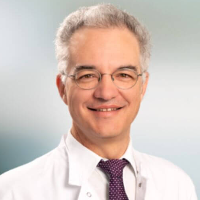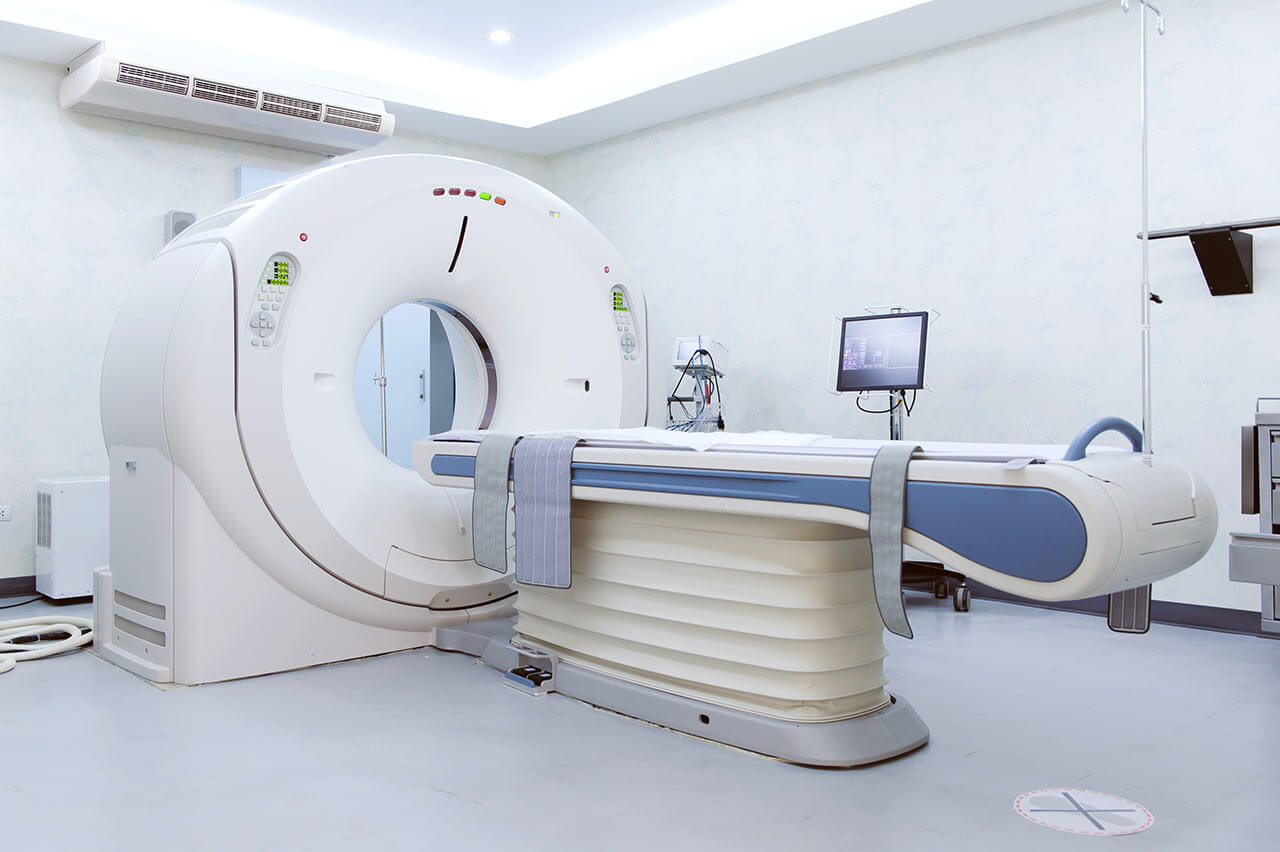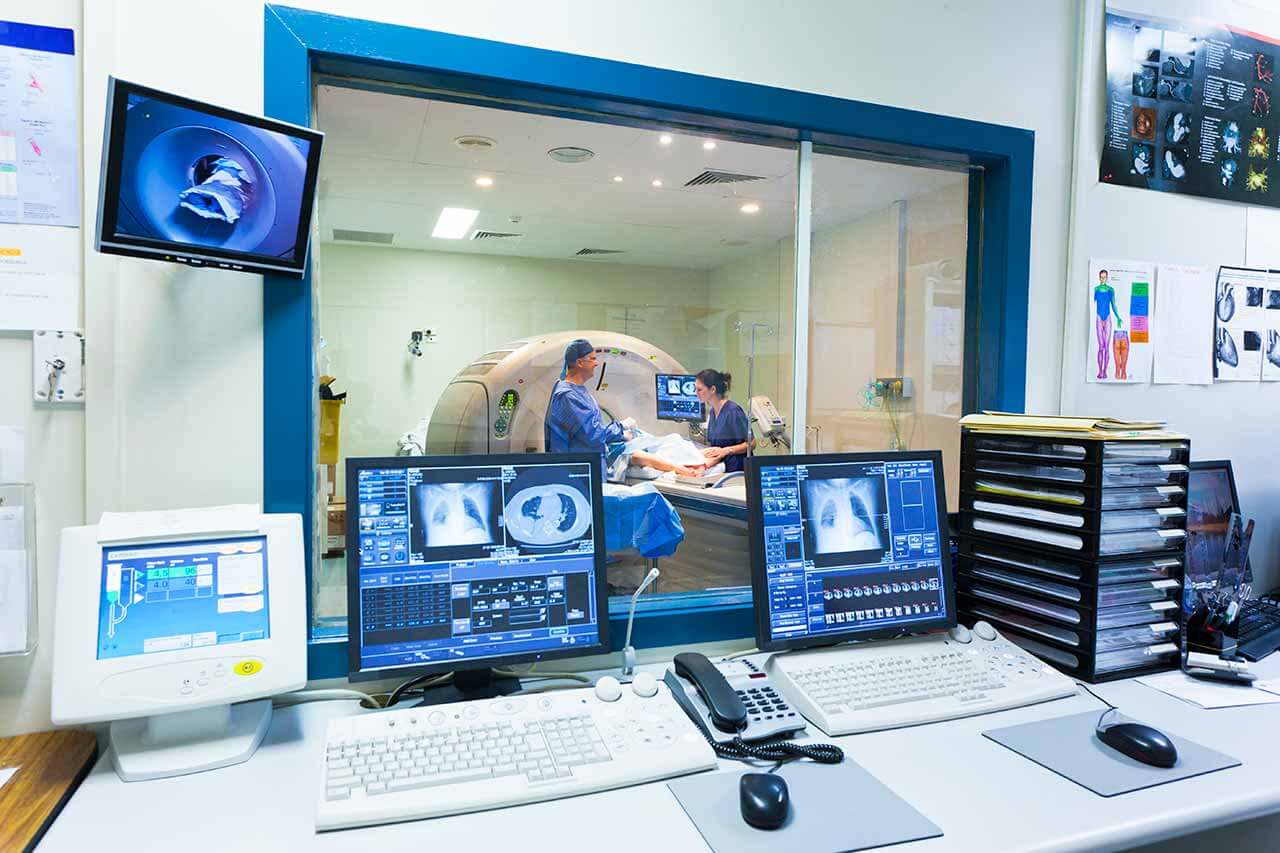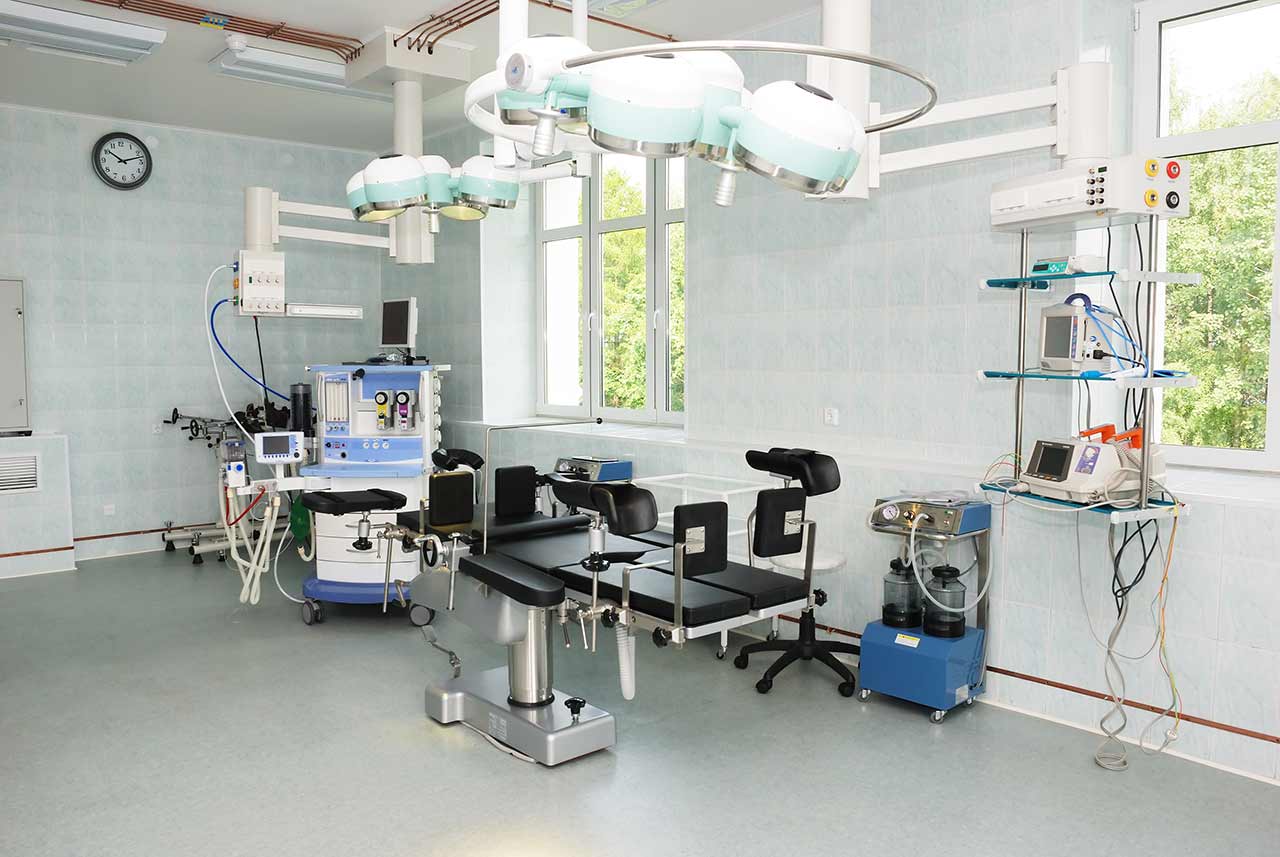
The program includes:
- Initial presentation in the clinic
- clinical history taking
- review of medical records
- physical examination
- laboratory tests:
- complete blood count
- biochemical blood analysis
- inflammation indicators (CRP, ESR)
- alpha-1-antitrypsin
- x-ray and bronchography
- electrocardiogram (ECG)
- high-resolution computed tomography (HRCT)
- collected three sputum samples
- pulmonary function test
- blood gas analysis
- bronchoscopy with biopsy
- histological and microbiological examination
- bronchial lavage
- nursing services
- development of individual treatment plan
Required documents
- Medical records
- Chest X-ray, MRI/CT scan (if available)
Service
You may also book:
 BookingHealth Price from:
BookingHealth Price from:
About the department
The Department of Pulmonology at the Specialized Pulmonary Clinic Asklepios Munich-Gauting provides the full range of diagnostic and therapeutic services to patients with diseases of the lungs, respiratory tract, and other chest organs. The department is one of the largest specialized medical facilities of this kind in Germany. The exceptional professionalism and long experience of the department's doctors allow for comprehensive treatment adapted to the patient's needs. The priority focuses of the department's work are the treatment of interstitial lung disease, pneumonia, chronic obstructive pulmonary disease, cancer, tuberculosis, and other pulmonary diseases. The department's doctors also have vast experience in providing medical care for patients with rare lung diseases. In the case of unclear or particularly complex pathologies, accurate differential diagnostics are carried out. The department has state-of-the-art equipment for diagnostic and therapeutic bronchoscopic procedures. Bronchoscopy is performed in the most comfortable conditions and is absolutely painless. The department's pulmonologists cooperate closely with thoracic surgeons, oncologists, and radiologists. The Head Physician of the department is Dr. med. Wolfgang Gesierich.
The department has excellent technical resources for bronchoscopy. The procedure can be performed for both diagnostic and therapeutic purposes. When performing bronchoscopy, doctors can visually assess the condition of the upper and lower respiratory tracts, and if pathological changes are detected, they often immediately perform the necessary therapeutic manipulations. The procedure requires a special instrument in the form of a thin tube (a bronchoscope), which is equipped with a camera, light, and manipulators. The bronchoscope is inserted through the patient's nose or mouth and then advanced through the throat into the lungs. High-resolution images are continuously displayed on a large screen. The procedure is performed under local or general anesthesia, so any pain is excluded.
The most common indications for diagnostic bronchoscopy are suspected tumors of the lungs and other chest organs, suspected airway stenosis or obstruction, chronic lung infections, chronic obstructive pulmonary disease, and other pathological conditions. For example, if a small neoplasm is detected in the lungs, the department's doctors immediately remove it endoscopically, which allows the patient to avoid traumatic classical surgery. In addition, large neoplasms in the chest organs often cause airway stenosis, as a result of which a patient develops severe shortness of breath and difficulty breathing. In such cases, the department's pulmonologists may perform endoscopic stent implantation. This is a procedure during which a stent (a structure resembling a frame) made of silicone or nitinol is placed in the narrowed area, which eliminates stenosis and ensures normal airway patency.
The department's team of doctors offers patients a modern method of endobronchial cryotherapy, which helps get rid of neoplasms in the lungs without any surgery. During the procedure, a special cryoprobe is used, which is inserted through a flexible or rigid bronchoscope. The specialist either affects the tumor superficially or carefully inserts the probe into the tumor. The probe destroys the tumor in a few minutes by cooling to a temperature of about -80 °C. At the end of the procedure, the bronchoscope is removed along with the cryoprobe and the remnants of the tumor or part of it (in the case of very large tumors). The cryotherapy method demonstrates high effectiveness, while bleeding is the only potentially serious complication of the procedure. The department's specialists accurately monitor the patient's condition after the procedure, and if any bleeding develops, they conduct drug therapy or argon plasma coagulation.
The department's therapeutic options also include the treatment of severe forms of pulmonary emphysema using endoscopic lung volume reduction. During the procedure, special spirals are implanted in the pathological foci, due to which the affected tissues atrophy and the healthy ones grow. Thus, the patient's lung function improves, and he can breathe normally. The department also uses the technique of endoscopic lung volume reduction using water vapor. The therapeutic effect is achieved due to the controlled introduction of water vapor through the catheter into the areas of the lungs affected by emphysema, which eventually leads to scarring and their volume reduction. Each of these methods has its own characteristics, so the department's doctors select the appropriate procedures on an individual basis.
The department specializes in the treatment of the following pulmonary diseases:
- Benign and malignant tumors of the lungs and other chest organs
- Chronic obstructive pulmonary disease
- Interstitial lung disease
- Pulmonary sarcoidosis
- Pulmonary hypertension
- Pneumonia
- Coronavirus infection
- Tuberculosis
- Rare lung diseases
- Other pathologies
The department's range of therapeutic services includes:
- Drug therapy: intake of pills, infusions, and injections
- Inhalation therapy
- Artificial lung ventilation
- Endoscopic therapeutic procedures
- Laser therapy
- Cryotherapy
- Argon plasma coagulation
- Photodynamic therapy
- Airway stenting
- Removal of foreign bodies from the respiratory tract
- Endobronchial hemostasis
- Endoscopic lung volume reduction
- Other treatment methods
Curriculum vitae
Since July 1, 2020, Dr. med. Wolfgang Gesierich has been the Head of the Department of Pulmonology at the Specialized Pulmonary Clinic Asklepios Munich-Gauting. Prior to that, the specialist worked in the same department as a Senior Physician.
Dr. med. Wolfgang Gesierich is board certified in Pulmonology and has an additional qualification in Emergency Medicine. The specialist received medical education at the Ludwig Maximilian University of Munich. Professional clinical training followed in 1998 at the Harlaching Hospital Munich. After that, Dr. med. Gesierich worked at the hospital in Erding, and then headed the Section for Differential Diagnostics and Bronchoscopy in the Department of Pulmonology at the Specialized Pulmonary Clinic Asklepios Munich-Gauting.
Dr. med. Wolfgang Gesierich has long experience in the treatment of respiratory diseases and unique professional skills in the diagnostic and therapeutic bronchoscopic procedures. The specialist is also actively engaged in research activities and cooperates closely with Prof. Jürgen Behr, who heads the Department of Pulmonology at the University Hospital of Ludwig Maximilian University of Munich.
Photo of the doctor: (c) Asklepios Fachkliniken München-Gauting
About hospital
According to the reputable Focus magazine, the Specialized Pulmonary Clinic Asklepios Munich-Gauting ranks among the top German medical facilities specializing in lung cancer treatment!
The clinic has earned the status of one of the leading medical centers in Europe in the area of its specialization. It is part of the Ludwig Maximilian University of Munich, which makes it possible to gain access to all the innovations in diagnostics and treatment. The medical facility has more than 70 years of history, so the clinic can be proud of its rich and successful clinical experience. The patients of the clinic receive medical care that meets the highest European standards. At the same time, the doctors at the clinic always provide patients with moral support and treat their life situation with understanding.
The clinic provides top-class conservative and surgical treatment for diseases of the lungs and other chest organs. In addition, innovative laser techniques are available at the clinic, and bronchoscopic procedures are successfully performed. Particular attention is paid to the treatment of lung cancer, chronic obstructive pulmonary disease, infectious lung diseases, pulmonary hypertension, emphysema, pulmonary fibrosis, mediastinal tumors, etc. A big advantage is the presence of the Department of Radiology at the clinic, where lung imaging is performed. In collaboration with the University Hospital of Ludwig Maximilian University of Munich, the specialists of the clinic founded the Lung Cancer Center. This was certified by the German Cancer Society.
A specific feature will be the fact that the clinic is located at a distance of 21 km from Munich, which is one of the largest and most beautiful cities in Germany. And what is more, Munich is home to many eminent academic and medical facilities, as well as outstanding historical monuments. In addition, the patients of the clinic will live in enhanced comfort rooms, corresponding to the level of a five-star hotel.
The Specialized Pulmonary Clinic Asklepios Munich-Gauting is an etalon Pulmonary Center that treats both simple and complex, extremely rare pulmonary diseases using innovative conservative and minimally invasive techniques. The clinic is known throughout Germany and far beyond its borders, and therefore it regularly admits patients from abroad.
Photo: (с) depositphotos
Accommodation in hospital
Patients rooms
The patients of the Specialized Pulmonary Clinic Asklepios Munich-Gauting live in comfortable single and double rooms. The patient rooms in the clinic are cozy and bright and also have small balconies, which offer a beautiful view of the park. Each patient room has an ensuite bathroom with a shower and a toilet. Standard patient room furnishings include an automatically adjustable bed, a bedside table, a TV, and a telephone. Wi-Fi is also available in the patient rooms.
The clinic also offers enhanced-comfort patient rooms, corresponding to the level of a five-star hotel. The patient room furnishing includes a comfortable bed, beautiful upholstered furniture, a desk with a reading lamp, a spacious wardrobe with a built-in safe, a free mini-bar, a TV, a telephone, a radio, and a CD/DVD player. The patient room is decorated with paintings and has modern lighting. The bathroom includes the necessary toiletries, a bathrobe, and changeable towels.
Meals and Menus
The clinic offers tasty and healthy meals three times a day. Breakfast and dinner are served as buffets, and for lunch, patients are provided with first and second courses to choose from. Selected, high-quality products are used for cooking, which guarantees excellent taste.
Patients who live in enhanced-comfort rooms are additionally offered fresh fruit, coffee and tea with desserts, snacks, and a rich selection of main dishes for lunch and dinner.
Further details
Standard rooms include:
Accompanying person
Your accompanying person may stay with you in your patient room or at the hotel of your choice during the inpatient program.
Hotel
You may stay at the hotel of your choice during the outpatient program. Our managers will support you in selecting the best option.




